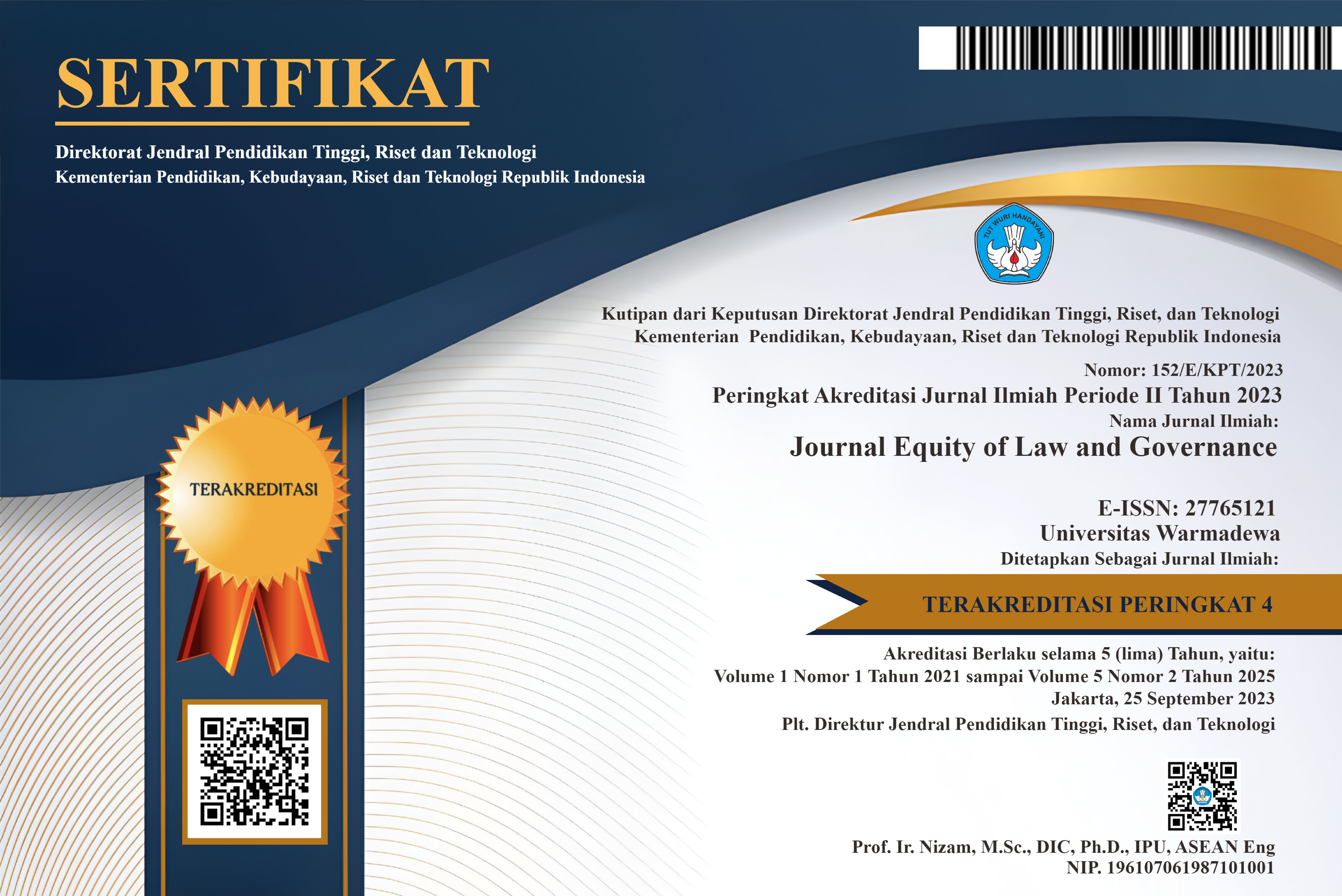Legal Responsibility Hotel Tourism Accommodation Company in Termination of Employment During the Covid-19 Pandemic
Abstract
The Covid-19 pandemic significantly impacted tourism accommodation companies, resulting in a drastic reduction in tourist visits and subsequent workforce layoffs, leading to terminations. Normatively, legal regulations have not comprehensively addressed the challenges arising from these terminations during the pandemic, leading to a legal vacuum regarding the responsibilities of accommodation companies towards terminated employees (rechtsvacuum). Empirically, the research focuses on analyzing the implications of legal protection on hotel and tourism accommodation workers facing termination due to the pandemic. This study employs a mixed-methods approach combining legal doctrinal and empirical research. Findings reveal the uncertain legal status of terminated workers in the context of hotel and tourism accommodation companies during the Covid-19 pandemic. Despite being sent home, these workers legally retain their employee status under the Job Creation Law, entitling them to monthly wages, allowances, and other associated rights. The regulatory framework addressing accountability for layoffs during the pandemic includes Article 156 of the Employment Law, Article 156 of the Job Creation Law, as well as PP Number 35 of 2021 and PP Number 37 of 2021. To enhance future accountability models for hotel and tourism accommodation companies regarding employment termination, an addition in paragraph (3) of Article 43 in PP Number 35 of 2021 is suggested specifically concerning laid-off workers' rights and obligations.
References
Agus, D. (2014). Perkembangan Pengaturan Jaminan Sosial Tenaga Kerja dalam Rangka Perlindungan Hukum Buruh/Pekerja. Fiat Justisia Jurnal Ilmu Hukum, 8(1), 53–68. https://doi.org/https://doi.org/10.25041/fiatjustisia.v8no1.286
Budiartha, I. N. P. (2016). Hukum Outsourcing: Konsep Alih Daya, Bentuk Perlindungan, dan Kepastian Hukum. Setara Press.
Candra, L. F. K., & Rekha, A. (2020). The Effects of Pandemic Era to Tourism Industry in Tangerang. Journal of Indonesian Tourism, Hospitality and Recreation, 3(2), 169–175. https://doi.org/10.17509/jithor.v3i2.25664
Diantha, I. M. P., Dharmawan, N. K. S., & Artha, I. G. (2018). Metode Penelitian Hukum dan Penulisan Disertasi. Swastu Nulus.
Isradjuningtias, A. C. (2015). Force Majeure (Overmacht) dalam Hukum Kontrak (Perjanjian) Indonesia. Veritas et Justitia: Jurnal Ilmu Hukum, 1(1), 136–158. https://doi.org/https://doi.org/10.25123/vej.v1i1.1420
Jayasuriya, & Ramburuth, R. (2021). Children, Human Rights and Temporary Labour Migration. Taylor and Francis Group.
Kurniawan Fajar. (2020). Problematika Pembentukan RUU Cipta Kerja dengan Konsep Omnibus Law pada Klaster Ketenagakerjaan Pasal 89 Angka 45 tentang Pemberian Pesangon kepada Pekerja yang di PHK. Panorama Hukum, 5(1).
Retnaningsih, H. (2016). Strategi Sistem Jaminan Sosial Nasional Bidang Ketenagakerjaan dalam Upaya Perlindungan Pekerja di Kota Surabaya dan Kota Pekanbaru. Aspirasi: Jurnal Masalah-Masalah Sosial, 1(2), 157–172.
Santoso, B. (2012). Hukum Ketenagakerjaan Perjanjian Kerja Bersama: Teori, Cara Pembuatan, dan Kasus. UB Press.
Sebardt, G. (2006). Redundancy and The Swedish Model in An International Context. Kluwer Law International.
Sudrajat, T. (2020). Perlindungan Hukum dan Pemenuhan Hak Pekerja pada Program Jaminan Kesehatan Nasional. Pandecta: Research Law Journal, 15(1), 83–92. https://doi.org/https://doi.org/10.15294/pandecta.v15i1.23647
Wibowo, A. P., & Sudiro, A. (2021). Perlindungan Hukum terhadap Pekerja dalam Pemutusan Hubungan Kerja (PHK) dengan Alasan Efisiensi Akibat Pandemi Covid 19. Jurnal Huku: Hukum Untuk Mengatur Dan Melindungi Masyarakat, 7(1), 135–153. https://doi.org/https://doi.org/10.33541/JtVol5Iss2pp102
Wibowo, R. F., & Herawati, R. (2021). Perlindungan Bagi Pekerja Atas Tindakan Pemutusan Hubungan Kerja (PHK) Secara Sepihak. Jurnal Pembangunan Hukum Indonesia, 3(1), 109–120. https://doi.org/10.14710/jphi.v3i1.109-120
Yoeti, O. A. (1996). Anatomi Pariwisata Indonesia. Angkasa.
Zanden, V. J. L., & Marks, D. (2012). Ekonomi Indonesia 1800-2010 antara Drama dan Keajaiban Pertumbuhan. Penerbit Buku Kompas.
Zukhri, N., & Rosalina, E. (2020). Acceleration model for tourism industry recovery based on environment post COVID-19. IOP Conference Series: Earth and Environmental Science, 599(1), 012090. https://doi.org/10.1088/1755-1315/599/1/012090
Zulkarnaen. (2021). Hukum Ketenagakerjaan Perspektif Undang-Undang Cipta Kerja (Omnibus Law). CV Pustaka Setia.
 Abstract viewed = 44 times
Abstract viewed = 44 times
 PDF downloaded = 35 times
PDF downloaded = 35 times













